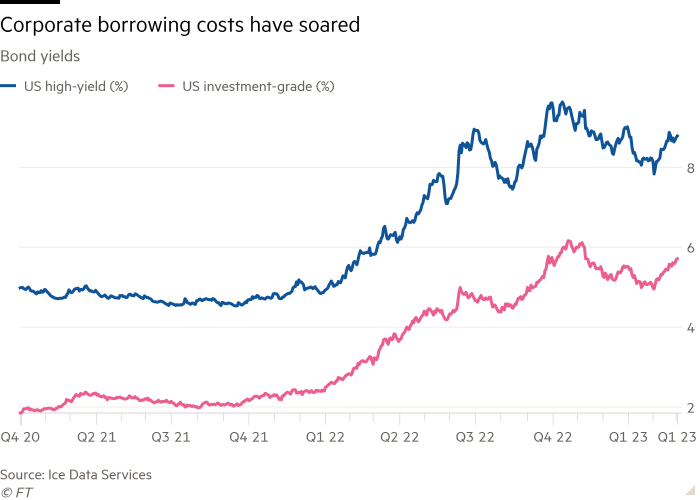Fear of ratings downgrades puts companies off debt-driven deals

Roula Khalaf, Editor of the FT, selects her favourite stories in this weekly newsletter.
Companies in the US and Europe that have borrowed on the cheap for years are facing the return of a once-familiar fear: ratings downgrades.
Borrowing costs have soared since the Federal Reserve started pushing up benchmark interest rates in an effort to curb inflation. Investors now demand annual interest payments of about 9 per cent a year from US businesses with low scores from rating agencies, up from just below 5 cent in March 2021.
That punchy price tag means high-grade companies are steering clear of taking on extra debt to fund expansions or takeovers, instead relying more heavily on equity capital to keep their pristine ratings in place.
“The big message is you need more equity now than you did 18 months ago because your rating matters more,” said Andreas Bernstorff, head of equity capital markets for Europe at BNP Paribas in London. “Subinvestment-grade market access is not great, and it’s expensive.”
When benchmark interest rates were low in the years following the financial crisis, and when central banks were buying bonds to support the system, companies could afford not to worry about ratings. But now, even safe, investment-grade companies in the US must pay an average of more than 5.7 per cent to borrow in the bond market, up from just 2 per cent two years ago.

That sharp increase in interest payments — and the wider gap in borrowing costs between high-quality and speculative-grade issuers — has sparked concerns over potential credit downgrades, while suppressing appetite for debt-financed transactions that could jeopardise ratings.
“Companies are more interested in protecting ratings now,” said Teddy Hodgson, global co-head of debt syndicate at Morgan Stanley. “I don’t see any appetite for any leveraging of [mergers and acquisitions] that risks a ratings downgrade below investment grade.”
Companies are taking on “fewer large leveraged buyout transactions”, said Gregg Lemos-Stein, a senior analyst at S&P Global Ratings. “Any time you have an increase in interest rates, it’s going to at least give any company the impetus to think about their optimal capital structure,” he added.
Signs of persistent inflation have stamped out an early-2023 bond rally, with markets now betting that US rates will stay higher for longer — topping 5 per cent through to the end of the year. They now stand in a range of 4.5-4.75 per cent.
That shift has led to some big swings in bond markets — bad news for lower-rated would-be borrowers.
“The high-yield market can shut down during times of volatility,” said Arvind Narayanan, a senior portfolio manager at Vanguard. “Companies are very mindful” of clinging on to their access to that higher-quality market, he said.
A recent report from S&P Global Ratings found that a quarter of triple B rated borrowers — those at the bottom end of investment grade ratings — from the US consumer products sector have cut their long-term leverage targets over the past year, partly due to higher interest rates. At the same time, the authors said the “M&A funding mix will shift and more equity will likely be used”.
High borrowing costs and a lack of clarity over the economic outlook have, in turn, led more companies to contemplate equity financing, including convertible bonds. So-called converts start life like other corporate bonds, but they include an option allowing investors to swap debt for equity if a company’s shares rise to a certain price. They can allow issuers to borrow more cheaply than a normal bond, meaning there is less extra risk of a downgrade.
Sales of converts in the US slumped by two-thirds last year, but monthly issuance for February was the highest since November 2021, according to data from Refinitiv. “The convertibles market has reopened with a bang,” said Tammy Serbée, head of fixed-income capital markets in the Americas at Morgan Stanley.
Some companies have been happy to launch debt-funded deals, but they have tended to be those with higher ratings or in sectors seen as less risky.
Markets were “still wide open” for high-grade borrowers, said Tim Kurpis, head of investment grade trading at AllianceBernstein, pointing to pharma group Amgen doing a $24bn bond deal last month to fund its acquisition of Horizon Therapeutics.
“The types of acquisitions that you’re seeing are in sectors that investors are a lot more comfortable with; more defensive sectors,” said Narayanan. “A lot of them are high-quality companies engaging in M&A, [which] don’t necessarily need to take a downgrade to do that.”
But bankers may be thinking harder about companies’ credit ratings before proceeding with some transactions — particularly if they are close to losing their prized investment-grade status.
“If there’s more of a cost to being a ‘fallen angel’, there’s more of an incentive to avoid it,” said Lemos-Stein.
Comments